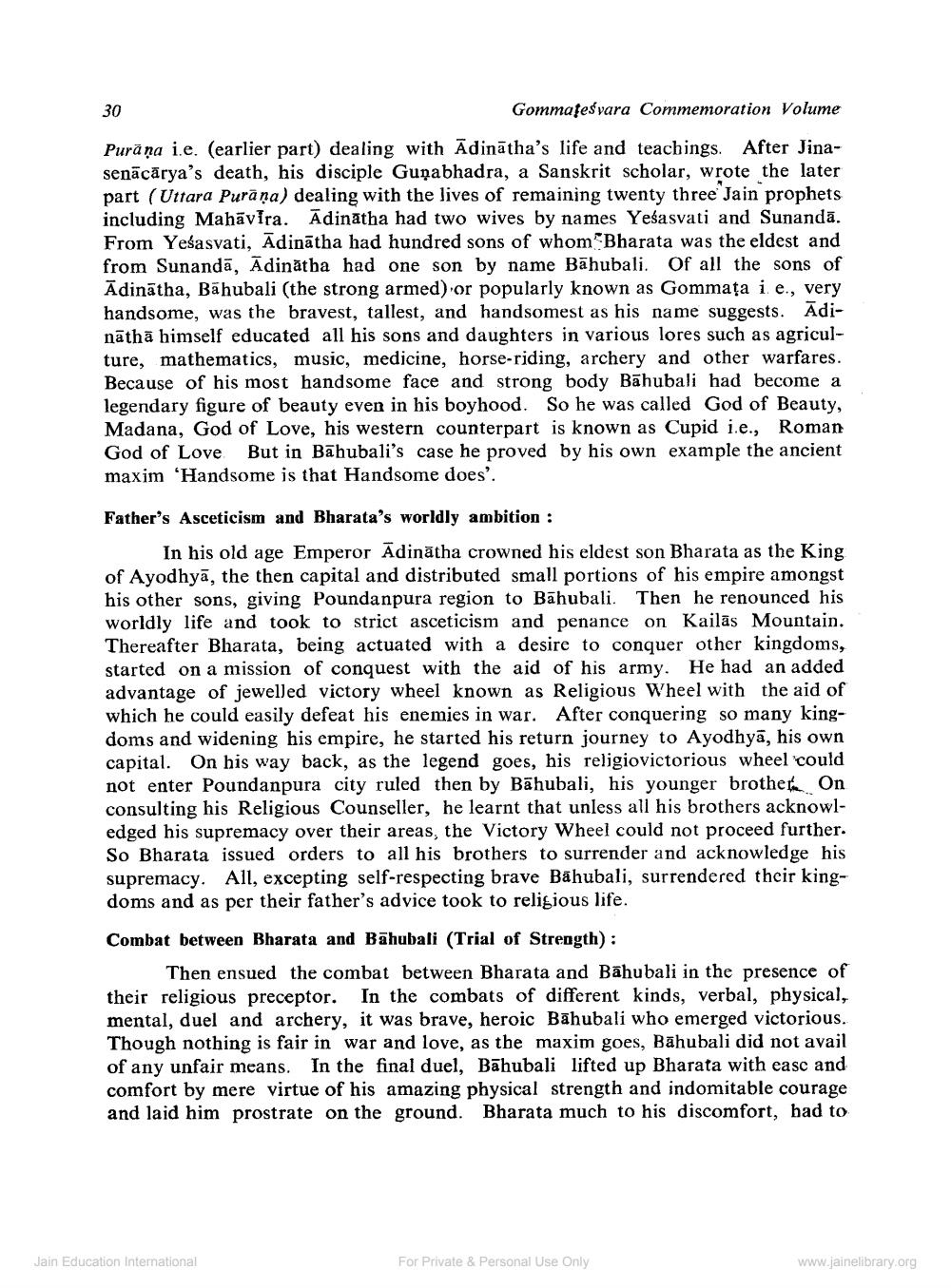________________
30
Gommatesvara Commemoration Volume
Purāņa i.e. (earlier part) dealing with Ādinātha's life and teachings. After Jinasenācārya's death, his disciple Guṇabhadra, a Sanskrit scholar, wrote the later part (Uttara Purāņa) dealing with the lives of remaining twenty three Jain prophets including Mahāvira. Adinatha had two wives by names Yeśasvati and Sunandā. From Yeśasvati, Ādinātha had hundred sons of whom Bharata was the eldest and from Sunandā, Ādinātha had one son by name Bahubali. Of all the sons of Ādinātha, Bahubali (the strong armed) or popularly known as Gommața i e., very handsome, was the bravest, tallest, and handsomest as his name suggests. Adināthā himself educated all his sons and daughters in various lores such as agriculture, mathematics, music, medicine, horse-riding, archery and other warfares. Because of his most handsome face and strong body Bāhubali had become a legendary figure of beauty even in his boyhood. So he was called God of Beauty, Madana, God of Love, his western counterpart is known as Cupid i.e., Roman God of Love But in Bahubali's case he proved by his own example the ancient maxim 'Handsome is that Handsome does'.
Father's Asceticism and Bharata's worldly ambition :
In his old age Emperor Adinātha crowned his eldest son Bharata as the King of Ayodhyā, the then capital and distributed small portions of his empire amongst his other sons, giving Poundanpura region to Bahubali. Then he renounced his worldly life and took to strict asceticism and penance on Kailās Mountain. Thereafter Bharata, being actuated with a desire to conquer other kingdoms, started on a mission of conquest with the aid of his army. He had an added advantage of jewelled victory wheel known as Religious Wheel with the aid of which he could easily defeat his enemies in war. After conquering so many kingdoms and widening his empire, he started his return journey to Ayodhyā, his own capital. On his way back, as the legend goes, his religiovictorious wheel could not enter Poundanpura city ruled then by Bahubali, his younger brother On consulting his Religious Counseller, he learnt that unless all his brothers acknowledged his supremacy over their areas, the Victory Wheel could not proceed further. So Bharata issued orders to all his brothers to surrender and acknowledge his supremacy. All, excepting self-respecting brave Bahubali, surrendered their kingdoms and as per their father's advice took to religious life.
Combat between Bharata and Bahubali (Trial of Strength) :
Then ensued the combat between Bharata and Bāhubali in the presence of their religious preceptor. In the combats of different kinds, verbal, physical, mental, duel and archery, it was brave, heroic Bahubali who emerged victorious. Though nothing is fair in war and love, as the maxim goes, Bāhubali did not avail of any unfair means. In the final duel, Bahubali lifted up Bharata with ease and comfort by mere virtue of his amazing physical strength and indomitable courage and laid him prostrate on the ground. Bharata much to his discomfort, had to
Jain Education International
For Private & Personal Use Only
www.jainelibrary.org




